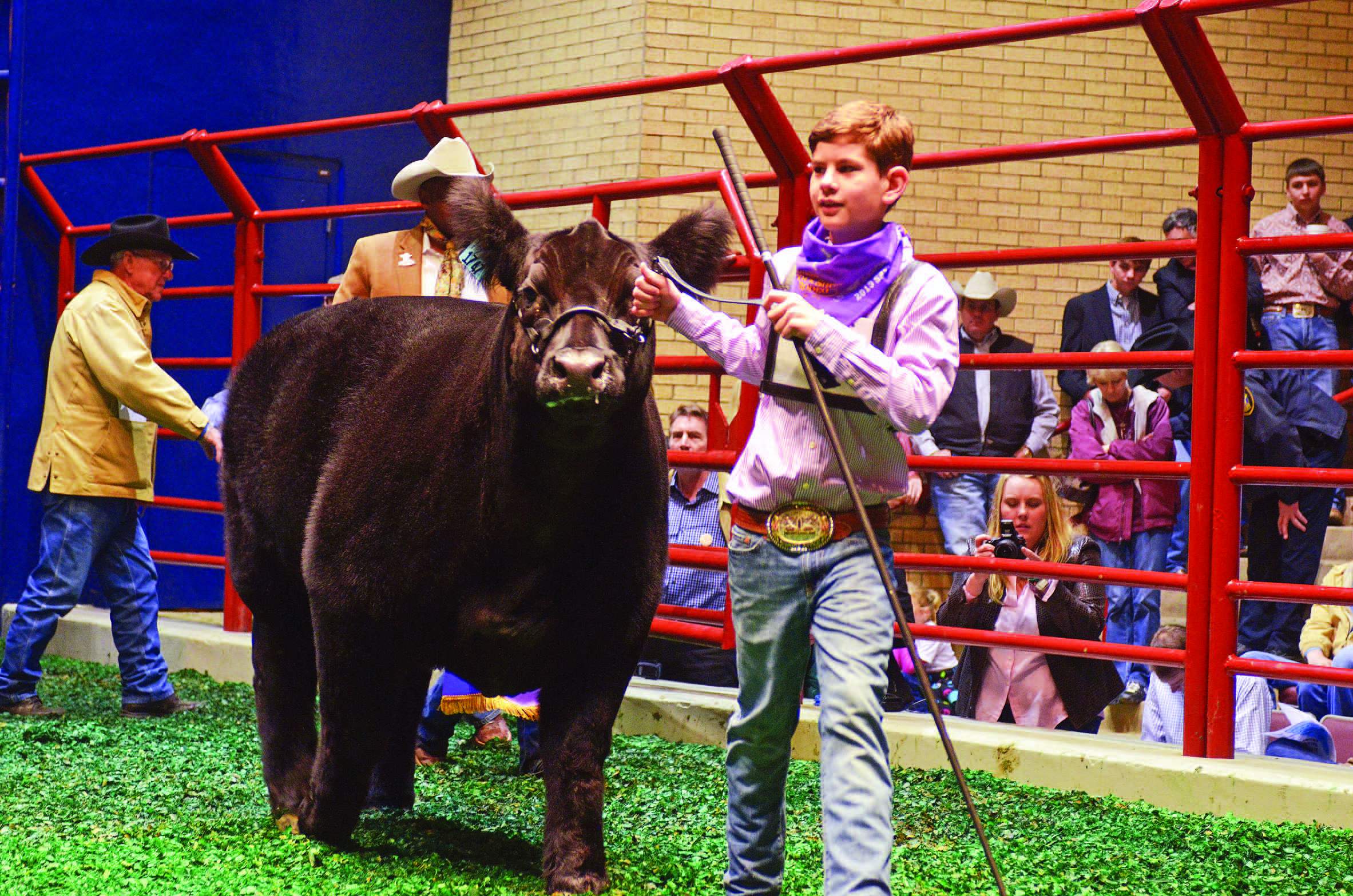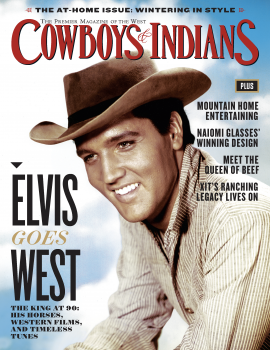At the Fort Worth Stock Show & Rodeo, a college education is the prize to win.
The gavel raps, the audience grows quiet, and the bidding begins. It’s February 8, and in the span of just four minutes, 12-year-old Stock Martin and his grand champion longhaired steer, Lunchbox, will stand quietly in the center of the arena, bearing witness to an incredible feat of generosity. Around the pair, the bidding creeps ever higher. The auctioneer’s voice rumbles and purrs over ever increasing figures, until the steer is sold to the highest bidder for $205,000 — every single penny of which goes directly to Martin.
The Fort Worth Stock Show & Rodeo — officially called the Southwestern Exposition and Livestock Show — is the country’s longest-running livestock show and rodeo, and an integral part of the Texas city’s history. Cowtown residents have long taken pride in the event, which was first held in 1896 on the banks of Marine Creek at the northern outskirts of town. More than a century later, the show has grown to tens of thousands of head of livestock and more than a million patrons during its now 23-day run.
Those patrons drum up a lot of cash, too: The Fort Worth Stock Show & Rodeo generates an estimated $100 million in economic impact for the city of Fort Worth annually. Because the Southwestern Exposition and Livestock Show is a nonprofit organization, the money raised at the stock show and rodeo is returned to the city either via enhanced facilities or advanced education. Over the years, the show has provided young people — the city and country’s future agriculture and livestock leaders — with millions of dollars in grants and scholarships. In addition to ticket sales, a nice chunk of that money has been generated thanks to the time and efforts of another nonprofit group, the Fort Worth Stock Show Syndicate.
Like so many good ideas, the organization, established in 1980, was formed in order to solve a problem. Local businessmen, including founders Don Weeks and Frank Neve, had attended the previous year’s ceremony and sale at the conclusion of the stock show, and were dismayed to see stock that had been raised and exhibited by youngsters selling at below market value. Young men and women had fed and cared for their animals for months, or even years, in hopes that they might be selected for the Junior Sale of Champions, a unique opportunity to sell their stock at auction. But after all of their hard work and hope to raise money for college tuition and future agricultural projects, they were left disappointed with submarket sale values.
The local businessmen were concerned. What kind of incentive was the Junior Sale of Champions actually providing future agricultural leaders if the time and money the young people invested was barely covering their expenses? So they formed a group and headed to the sale the following year planning to spend $13,000 on livestock and raise the stakes. But the “kids got the best of them,” and they ended up spending $20,000. The members promptly organized themselves into a 501(c)(3) charitable organization and set about soliciting friends and business partners for contributions for the next year’s sale. Their efforts proved fruitful, and in 1981, the group purchased 59 steers for $130,000.
Today, the Fort Worth Stock Show Syndicate is the single largest financial supporter of the Junior Sale of Champions held during the Fort Worth Stock Show & Rodeo. Many syndicate members, like BB&T Bank vice-president Henry Borbolla, were born and raised in Fort Worth and have their own memories of the stock show.
“It is truly my favorite time of year in Fort Worth,” he says of the annual event, which is held every January. “[The syndicate] is a way to be a part of what I call the time-honored tradition of the stock show, and I really feel like we have a very important part in helping make the sale a success.”
Each syndicate member — today there are more than 125 of them — is responsible for raising a minimum of $8,000, either through individual donations or sponsorships. “We are a little bit like a football team in that we all have assignments to carry out, and when we do, the results for these kids are pretty amazing,” explains Trey Gordon, vice-chairman of sponsorship.
To offset any potential overhead costs, the Fort Worth Stock Show Syndicate partners with local businesses and relies on its members’ generosity to help host its annual breakfast, which is held the morning of the sale, and its annual party for sponsors. Gordon says potential sponsors are thrilled to hear that 100 percent of their donations will go to one child. Eager to be at the sale, sponsors often end up bidding on the animal themselves and are able to meet the recipient of their donation face-to-face.
“The buyers want to be there,” Gordon says. “They want to make a presence, be part of the process, meet the kid, and see the animal they’re buying. It’s a feel-good thing.”
Borbolla agrees. “You see the direct result,” he says. “You meet the kid whose animal you purchase, and the family is just so grateful. It’s a lot of time and money and blood, sweat, and tears involved in raising these animals, and sometimes the money just goes to the family. They’re not always families of great means, so they kind of count on the money for educational purposes. I think that meeting the kid and seeing the genuine gratitude that they impart to you is not why we do it, but it certainly is nice to see.”
Plus, there’s nothing quite like a live sale. The spirit of competition hangs heavy in the air: The kids have worked hard to be chosen to walk their animal around the ring at the Junior Sale of Champions, and the donors are eager to win their choice animal. The sale, which lasts for nearly five hours, doesn’t even stop for a break. Not that you’d notice if you’re sitting in the audience on the edge of your seat.

“Part of what makes the sale so successful is that at least 80 percent of the sponsors, either individuals or representatives for the companies that support the syndicate, are there actually bidding on those animals in a live auction format,” explains Scott Prince, Fort Worth Stock Show Syndicate chairman. “And that generates a tremendous amount of enthusiasm. It is really very exciting.”
Prince adds that meeting the recipient of a donation personalizes the impact that the investment is going to make on an individual’s life and counts that personalization as a large part of the syndicate’s fundraising success. “I do think having an opportunity to meet the child and family that the donation is benefitting is a significant part of the attraction and the allure, and what keeps people coming back every year,” he says.
And every year, the syndicate increases its success, monetarily speaking. In 2006, they broke the $2 million mark for sale-day proceeds. By 2010, the syndicate’s 30th anniversary, that record increased to nearly $2.8 million. In 2013, the sale topped $3 million.
“This group’s tireless efforts are invaluable to the show,” says Brad Barnes, president and general manager of the Southwestern Exposition and Livestock Show. Though the groups are separate entities, publicity manager Shanna Weaver explains that they work very closely together. “The members of the syndicate truly understand the value of paying above-market prices for the livestock that is auctioned off during the annual Junior Sale of Champions, and they work hard year-round raising funds for the sale,” Weaver says. “Their efforts are invaluable to our show, and without them that sale would not be as successful as it is.”
In the 34 years the syndicate has operated, the group has raised more than $38 million, which has been distributed to more than 7,000 children and young adults. In 1985, the syndicate established the James M. “Jim Bob” Norman Memorial Scholarship Fund, which provides scholarships to National FFA Organization and 4-H participants who pursue an agricultural or life sciences degree at a Texas college. Every year, $100,000 in scholarships is awarded to 10 recipients, who each receive $10,000. But, according to Prince, that number might soon change. “Our goal is to be able to increase that to $200,000 within the next few years and expand to 20 scholarships per year,” he says.
The goal of presenting scholarships is straightforward: To encourage young people to pursue agriculture as a career by providing the educational means and vocational opportunities necessary to do so. Sometimes the money awarded might go to tuition; sometimes it might go to a seed project. Regardless, syndicate members, themselves successful businessmen, are rewarding the hard work and character development that comes from raising an animal.
“These individuals that raise the steers, they have to put in a lot of time and effort,” Gordon says. “It’s like having a job. It’s their first job in many respects, and they have to take on a great deal of responsibility.”
And just as hard work breeds responsibility, so too is the syndicate’s mission a natural consequence of the agricultural heritage so embedded in Fort Worth. “Part of the heritage that we’re promoting is the pursuit of agriculture,” Prince says. “And that doesn’t necessarily mean agriculture in its purest form — it could mean research and development; it could mean the business of agriculture. But it really does align very nicely with the mission of the Southwestern Exposition and Livestock Show. The Fort Worth community still has a significant historical heritage in the farming and ranching community, and is therefore interested in preserving and enriching the Western heritage.”
For more information about the Fort Worth Stock Show Syndicate, visit www.fwsss.com.
From the November/December 2013 issue.












